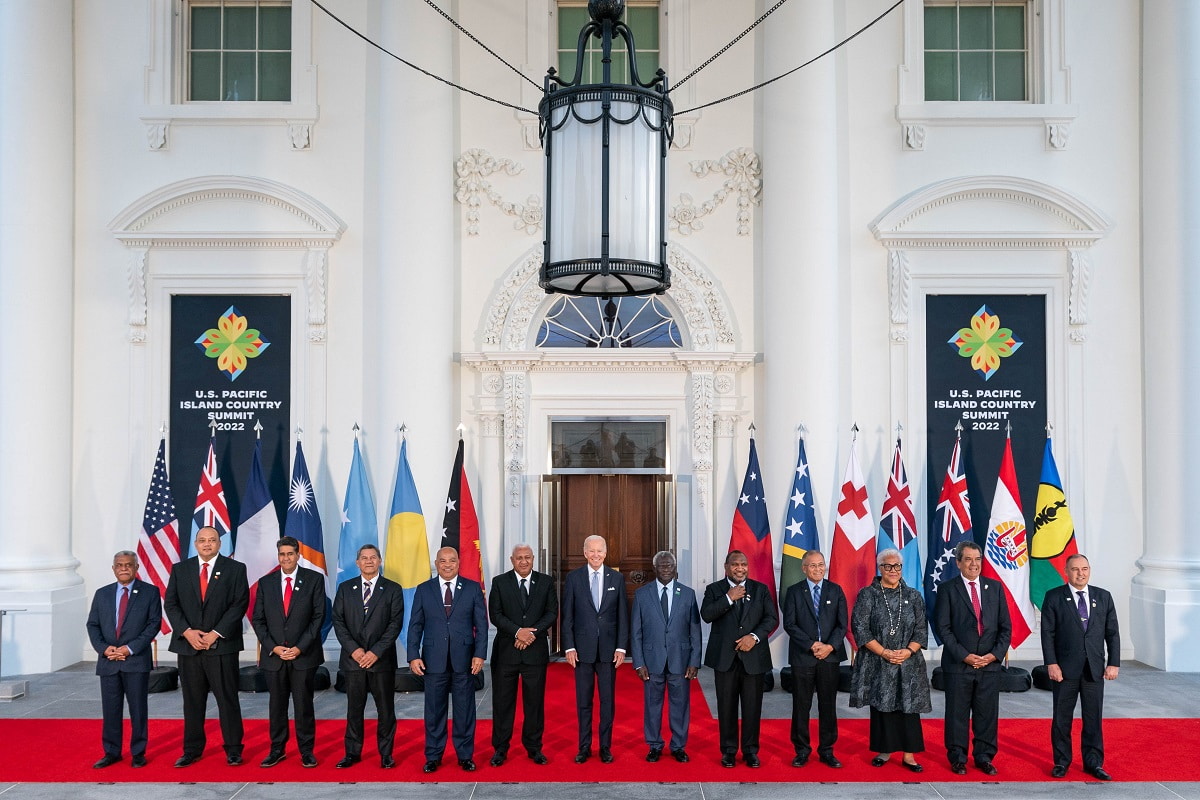In 2022, Vice President Kamala Harris announced via video call into the Pacific Islands Forum that the Pacific was going to get a “huge” aid boost from the United States, tripling assistance to $600 million. Instead of the applause the Biden administration likely thought they would receive for such an initiative, the media headlines pointed to the history of American neglect in the region. Robert Bohn, an adviser to Vanuatu’s foreign minister, told Al Jazeera:
Obviously the US is late to the party, but as they say, better late than never … I have been telling the USA to get into the game since 1992. More is always better, but a start is always good.
One of Biden’s key Pacific engagement pieces was the introduction of the US-Pacific Islands Summit. This summit has occurred twice, in 2022 and 2023, and garnered mixed reactions. It was acknowledged that the summit was more ambitious compared to any other president’s attempt to diplomatically engage the region. However with the Cook Islands and Niue not invited, and Nauru, Kiribati and Vanuatu not sending leaders, the summit was seen as somewhat undermining the “Pacific Way” regionalism.
Nevertheless, the US-Pacific Partnership signed at the 2022 forum outlined America’s commitments to bolstering regionalism in the Pacific, addressing climate change, supporting economic development and Covid-19 recovery, and addressing the legacies of conflict and the promotion of nuclear non-proliferation.
Pacific security was also a hallmark of the Biden administration, signing a bilateral security agreement with Papua New Guinea in 2023 and multiple bilateral ship rider agreements that allow Pacific maritime law enforcement officers to ride aboard US vessels as part of joint maritime security operations.

In 2023, Biden promised he was listening to the climate concerns of Pacific leaders, committed another $200 million in climate assistance to the region, and established diplomatic ties with Cook Islands and Niue. A number of new American embassies have also opened across the region, including in Solomon Islands and Tonga in 2023, and Vanuatu in 2024.
Yet the Biden administration also struggled with older commitments to the region. The Compacts of Free Association (COFA) agreements with Marshall Islands, Palau and the Federated States of Micronesia have existed since the 1980s and 1990s and give the US military access to the freely associated states in return for substantial financial assistance and the right for citizens to work in the United States. The COFAs expired in 2023, but renewal of the agreements was delayed by five months as their funding was tied to aid packages to Ukraine, Israel and Taiwan and was caught up amid wrangling in the US Senate. Eventually the agreements were renewed for another 20 years and will have US$7 billion dollars to fund.
Where attention is given, the emphasis is on an “Indo-Pacific” concept and regional geopolitics rather than development and climate change, which does not resonate as much in the Pacific.
There are other headwinds buffeting America’s Pacific engagement strategy – climate policies and practices are the most obvious. In 2020, Pacific Island leaders were quick to congratulate the newly elected Biden administration, praising the president’s climate campaign promises and commitment to rejoin the Paris Agreement. This led to Fiji’s then prime minister Frank Bainimarama extending an invitation to Biden to travel to Fiji for the 2021 Pacific Islands Forum meeting.
However, the Biden administration has not fully delivered the “dramatic” emissions reductions flagged. New legislation that will allow the continued expansion of oil and gas production in the United States will likely be a key concern of many Pacific Island leaders and local climate activists alike.
Another hiccup was Biden’s gaffe earlier this year, telling a story about his uncle being supposedly eaten by cannibals in Papua New Guinea during the Second World War, which was poorly received and described as a new “low point” in PNG-US relations.
There are also concerns that American policy is distracted. Obviously the wars in Ukraine and Gaza have stretched the American aid budget, and have also raised questions about the amount of attention these crises leave for a focus on the Pacific. Where attention is given, the emphasis is on an “Indo-Pacific” concept and regional geopolitics rather than development and climate change, which does not resonate as much in the Pacific.
As the Biden years wind down, American officials are seeking to send reassuring signals that relations with the Pacific are “bipartisan” and will not change with a change in administration. The test will be whether US Pacific engagement is as “enduring” as claimed.


